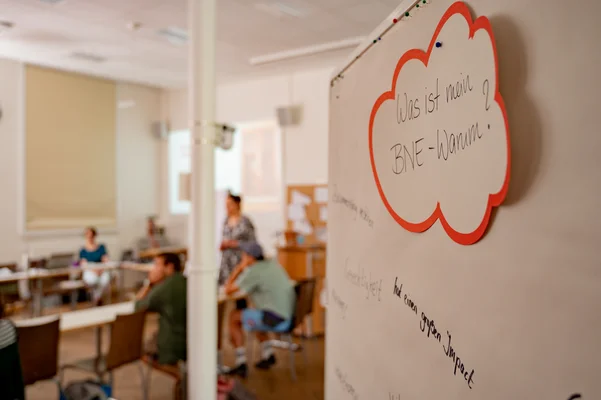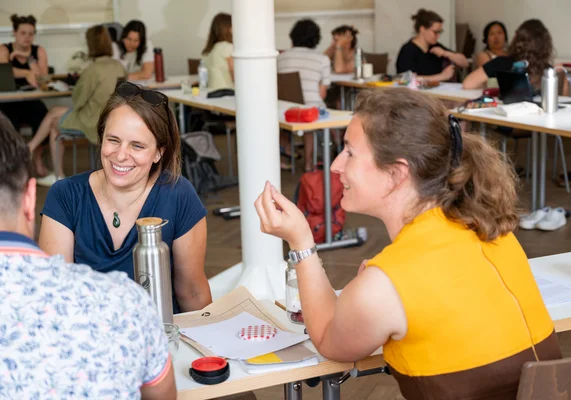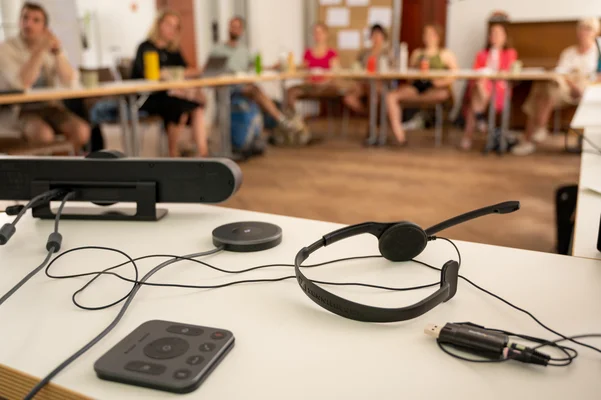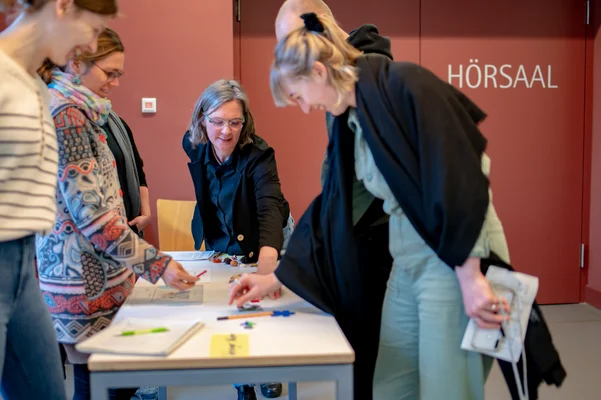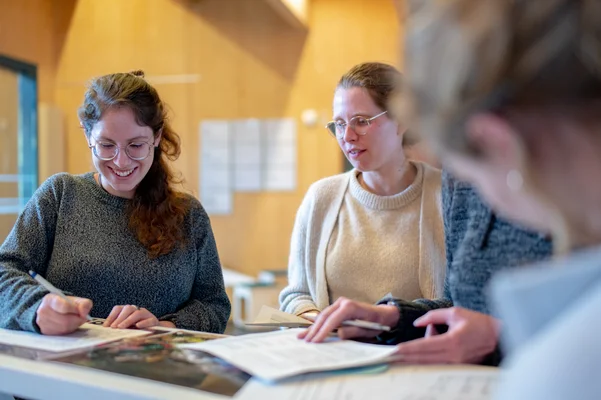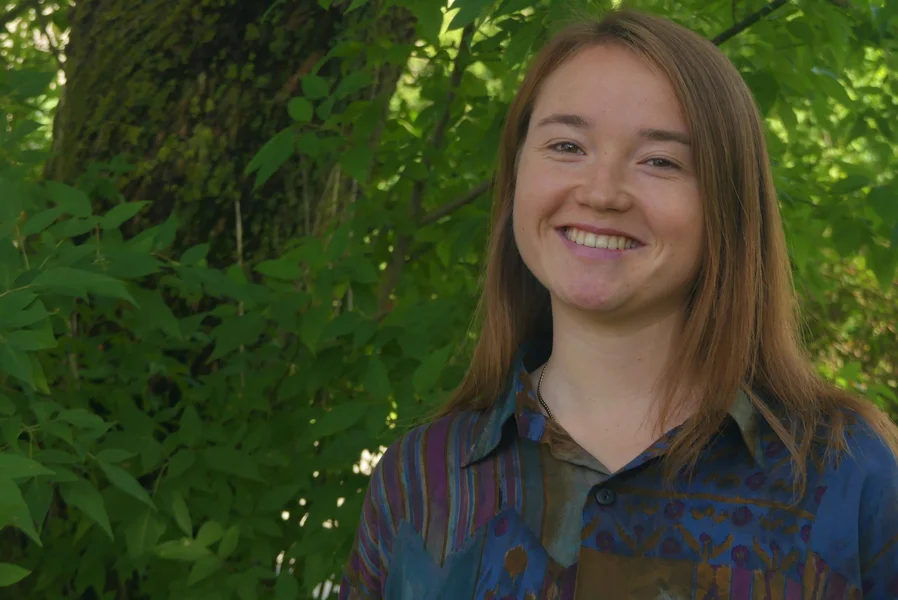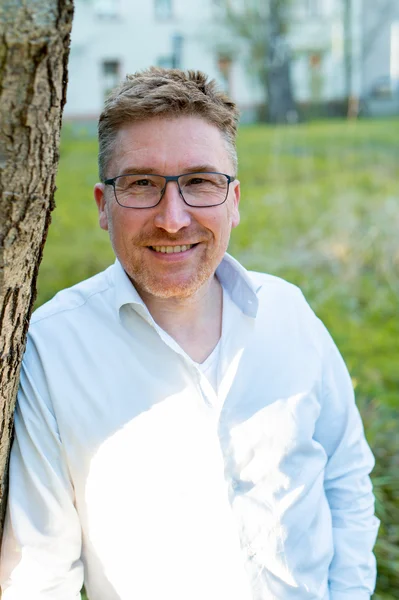Individual study contents
In the degree programme, you will learn about ESD as an effective transformative force, starting from the basics of education and sustainability. You can actively apply your new knowledge and methods right away in a practical ESD project. So that you can study flexibly, you will learn with e-learning tools, in self-study and on 2-3 weekends per semester in presence on site at the HNEE. You will learn to recognise complex interrelationships in the educational context of sustainable development, to develop your own ESD projects and to shape educational and transformation processes.
In the first semester, you will acquire the theoretical foundations in the field of sustainability and educational sciences as well as (environmental) psychology in introductory modules.
New strategies and concepts for sustainability often require a change in action routines. In the module you will learn about factors influencing people's actions. It will be analysed which influences can be meaningfully changed to trigger sustainability-oriented behaviour.
This module provides you with the basics of the terms and concepts used in educational sciences. It strengthens the understanding of education as a lifelong process and addresses the importance of education in social transformation processes. You will get to know pedagogical, didactical and methodological approaches.
In the first module, you will deal with selected aspects of sustainability. The basis for this is in particular the textbook "Man in the Global Ecosystem - An Introduction to Sustainable Development", in which a systemic understanding of sustainability is developed.
In the second semester, the educational concepts ESD and Global Learning are central topics. You will further develop pedagogical and didactical competences in order to be able to develop your own educational concepts in a technically sound way. You start your 3-semester ESD practice project with the module Project Planning.
Over three semesters, you will implement a practical ESD project, ideally with a cooperation partner. With professional supervision, you will deepen your knowledge of project management. In the project, you can work on a problem for your own institution or set up a reference project with new partners. The first step is the development of a project concept.
Global learning as an educational concept addresses worldwide developments and related problems, risks and opportunities. The focus is on global connections and the effects of ecological, economic and social processes on the environment and society. They deepen the basics of Global Learning addressed in the module "Introduction to Education for Sustainable Development".
Building on the basics of the modules "Introduction to Educational Sciences" and "Introduction to Sustainable Development", this module deals intensively with the topic of Education for Sustainable Development. You will be enabled to develop, implement and evaluate your own ESD concepts.
In the third semester you will learn to create spatial references in order to be able to interact with ESD in regions and networks. You will get to know the actors of ESD in various fields of work and as possible cooperation partners.
In sub-module 6b of the ESD practice project, you will implement your project. Based on your acquired knowledge, you will use project management methods to control this process. You will deal with the basics of evaluation and learn to manage challenges that arise in the project by making targeted decisions.
This module teaches how ESD can contribute to sustainable development in rural or urban areas. You will learn about potentials and framework conditions for a practical anchoring of ESD offers in the context of different regional development approaches.
In this module you will deal with the understanding of educational landscapes. Their management is considered from the perspective of the networking of different educational offers.
In the fourth semester you complete your ESD practice project. In the module Education Marketing you learn how to reach your target group with your offer. At the same time, you will prepare for your Master's thesis in the Research Methods module.
In the last sub-module of the ESD practice project, the project implemented in the 3rd semester is evaluated, critically reflected upon and you review the achievement of the project goals set in the planning. The focus of this phase in the project is writing the final project report.
You will learn how to make ESD education offers visible to a target group and how to design suitable advertising material. Strategies of education marketing will be presented and discussed. In particular, current trends in digitalisation and social media platforms will be addressed.
In this module, you will prepare for the Master's thesis and deal with the basics of quantitative and qualitative research methods. You will independently develop a research design for a scientific investigation.
You work on your Master's thesis. Upon completion of the programme, you will receive the degree "Master of Arts".
Now you complete your studies with the Master's thesis! In doing so, you will use the knowledge and skills acquired during your studies at a scientific level. In the colloquium, you discuss your research question for the Master's thesis.
Attendance dates
Get to know our students
Students from various fields of work report on their studies, the compatibility of studies and career and what they find exciting about the course content.
Interview with Sophia Schwan
"The degree programme shakes things up and shows how everything is connected."
Sophia Schwan grew up between America and Germany, studied journalism and journalism in Scotland and then worked in the fashion industry. During the Covid-19 pandemic, she took a new path: she looked after a flock of chickens on the Börnicke community estate and heard about the Master's programme "Education - Sustainability - Transformation".
Read the whole interview here!
What surprised you the most during your studies?
The project during my studies inspired me deeply - even though things didn't go so smoothly for me. It gave me the opportunity to work on a subject close to my heart, to learn how to set up a project structure and implement it in the long term.
What was your favourite topic?
Regional wool and saving resources. Domestic wool is often not processed because it is not economically viable and because the infrastructure for this is now lacking in Germany. Instead, an incredible amount of local wool is thrown away and burned. In return, we then import wool from other countries. The project gave me the opportunity to experience all the wool processing steps: I was there when the sheep were sheared, helped sort the wool, talked to the shearer and was able to really immerse myself in the subject. I got to know a fibre expert who taught me a lot. The topic is so complex, you can look at and analyse it from countless perspectives.
What is your career path like now?
I recently started working for the local newspaper - MOZ - as a climate reporter. After almost ten years of freelance work in the fashion sector, I asked myself: where can I make a difference with this degree, where can I help with my experience and skills? Studying at HNEE was the decisive factor in my decision to join the newspaper. I enjoy the task of reporting on global issues that affect everyone at a local level so that local people feel that their decisions have an impact. I think it's great that a newspaper in Brandenburg was actively looking for a climate reporter with the idea of educating and inspiring, but not lecturing. Somehow it all fell into place so nicely - without the Master's degree, it certainly wouldn't have happened.
Why do you think the degree programme is worthwhile?
The Master's opens up new worlds of thought, new opportunities for self-realisation and personal initiative. It gives me the opportunity to recognise structures in my own life. It shows me how and where I can contribute. The degree programme shakes things up and shows how everything is connected. It gives me didactic solutions and takes away the feeling of powerlessness. Everyone can incorporate what they have learnt into their profession. And that's what I find so special about this degree programme: it's so flexible and impactful at the same time.
Who would you recommend the degree programme to?
You definitely need to be curious and open to analysing and adapting your own life. You have to have stamina and these topics have to be incredibly important to you so that you stick with it. The desire for change and participation should be very present. Ultimately, the idea of the degree programme is to train changemakers and you can have a slightly activist streak.
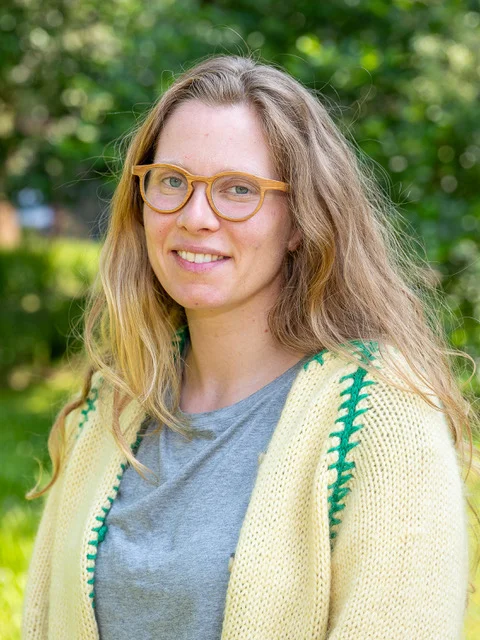
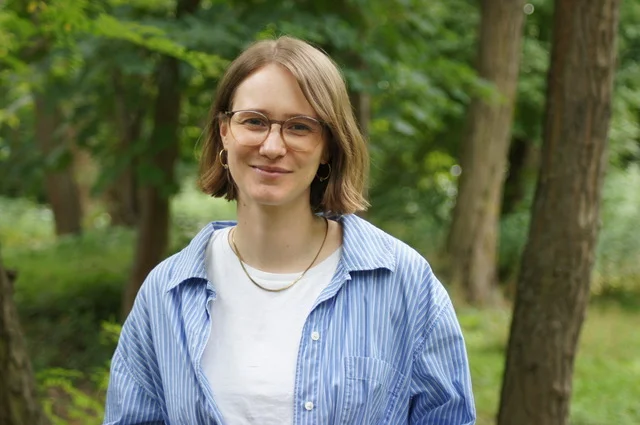
Interview with Leonie Bunke
"I want to create positive images of the future, encourage people and take action together"
Leonie studied for a Bachelor's degree in Organic Farming & Marketing at HNEE, while also working as a lecturer in sustainability education and then as an educator. She then decided to combine her favourite subjects of education and sustainability and return to HNEE for the part-time Master's degree in "Education - Sustainability - Transformation".
Read the whole interview here!
Education for Sustainable Development (ESD) is at the heart of your degree programme. What does ESD mean to you?
What I find so great about ESD is working with positive visions of the future. ESD is solution-orientated - I get ideas that I can use to initiate something. And ESD is action-orientated. This means that in a seminar, for example, I can not only convey what difficulties there are from an ecological or social point of view, but also look at what I can do myself and where I can help shape the framework conditions. For me, ESD means looking away from the ecological footprint and towards the handprint.
Why is this so important to you?
There are times when I worry about social and ecological developments - about the future of our society. For me, ESD is a way to get out of passivity and into action. This degree programme is my coping mechanism for dealing with the world situation.
What challenges did you face during your studies?
Above all, self-management - you simply have to be incredibly well organised in order to manage everything well: having a working life, taking private time for care activities and to recharge your batteries and then doing this degree. It was also challenging to actively approach others and say "Hey, let's meet up in the library, exchange ideas, study together". That's definitely a challenge when everyone is spread out all over Germany and beyond.
What advice would you give to future students on how to master the degree programme?
It's a super good thing to network right from the start and find people you enjoy studying with. To be honest, there were times when I briefly forgot that I was studying. There's a lot going on at work, then there's something private - and if there's no study date in your diary and nobody asks where you are, your studies can slip away. That's why I regularly met up with fellow students in the library last semester - it went really well.
Why was the degree programme worthwhile for you?
I now have a deeper understanding of sustainability, in the sense of systemic sustainability thinking. I think I've really understood what sustainability is all about, i.e. not just painting something green and saying: hey, fully eco, but thinking systemically and looking at organisations in terms of the whole institution approach. I find this valuable because I know that I will be able to use this in my everyday life, in my private commitments and in a professional context. Through my studies, I have put on ESD glasses.
Interview with Sophie Stebner
"I found the module weekends in Eberswalde incredibly inspiring and gained courage and energy there."
Sophie lives in Berlin and has been working for the NGO ProjectTogether, which operates at the interface between civil society organisations, business and politics, for five years. Sophie studied economics and has been working in the field of social entrepreneurship ever since. Her heart beats for education - the BNT Master's programme was to be her springboard there.
Read the whole interview here!
How do you relate to ESD?
As part of my work, I help to create creative spaces and connect people in order to promote social transformation. We look at a specific issue and bring together actors with different perspectives who are affected by this issue along the value-added chain, but who are also needed to find a solution - diversity of perspectives and interdisciplinarity are important for this.
Why did you enrol on the BNT Master's programme?
As it is a Master's programme that provides further education, I was able to join with my Bachelor's degree in economics. I attended consultation appointments before starting the programme and was surprised at how diverse the backgrounds of the other prospective students were. They all have a similar goal, but come from very different perspectives. I realised that what I try to do in my professional context, I can experience for myself during my studies.
What did the degree programme change for you?
My heart beats for the education sector. I saw the degree programme as a stepping stone to get closer to this goal. Before the Master's programme, I still lacked an understanding of how education, sustainability and transformation can be thought of together. Through the degree programme, I learned how education can be designed to enable transformation and I now go out with methods that support this.
What was your biggest challenge during your studies?
I found the module weekends in Eberswalde incredibly inspiring and gained courage and energy there. Before and after that, I was initially on my own. To change that, I often met up with a fellow student on Fridays, either in the library or at her place or mine. Firstly, we created a regularity that encouraged me not to go to the lake on Fridays, but to do my Master's instead. And secondly - which is also so valuable in this degree programme - we exchanged ideas instead of being alone.
What influence does the diversity of the students have on your own academic success?
That's one thing that really appealed to me. I benefit from it because I don't come from an educational background myself, I didn't study in that direction or work in a school context, for example, but I'm incredibly interested in it. My fellow students give me insights - into the school system or the political system, for example. I can see where in the system who's plugged in? What challenges, but also what opportunities are associated with this? The exchange helps me to pave my own way.
Why was the degree programme worthwhile for you?
It was worth it because I gained impulses for my everyday work and life, clarity and structures, new concepts and words for things that I already do and now understand better.
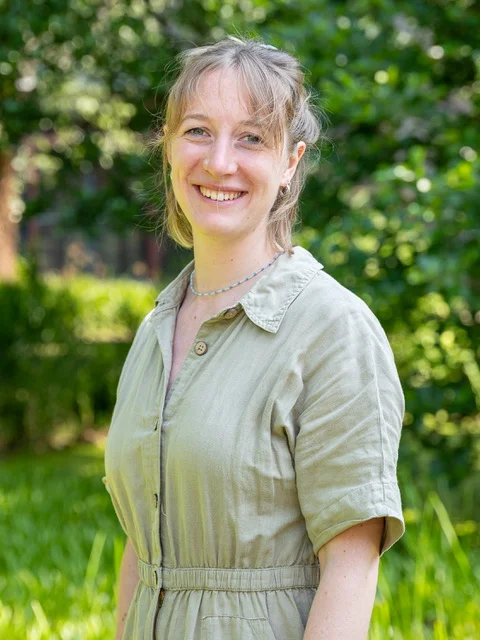
FAQ study contents
Each module begins with an online kick-off meeting at which information is provided about the module objectives, content and procedure. In addition, as a student you will already receive initial information on the examination performance and assignments for the subsequent self-study phase. For each module, you will receive learning materials, such as teaching letters, books, online literature or learning videos. After the first self-study phase, there is usually a presence weekend in Eberswalde, where the findings, tasks and questions from the self-study phase are discussed. Participation in the attendance weekends is not compulsory. However, the attendance weekends offer the opportunity for exchange and consolidation. The times are based on the following framework:
Friday: 14:30 - 20:15
Saturday: 8:30 - 20:15
Sunday: 8:30 - 13:15
In addition to attending on site, students can also (passively) participate online. This is an additional offer which does not fully cover all course contents (e.g. exercises). We therefore recommend on-site participation.
After the attendance weekend, the second self-study phase takes place for consolidation and preparation of the examination performance.
All information on the individual phases of the modules will be made available to you on the Moodle learning platform.
You should plan on an average of about 20h per week. There will be peaks before exams or homework deadlines.
You will acquire 6 ECTS per module. One ECTS corresponds to 30 working hours, so you should plan for about 180 hours per module.
The time required may be reduced by the synergy of work and study, e.g. by planning and implementing an ESD practice project in your own professional environment.
To make it easier for you to study and combine your studies with your professional activities, we spread out the workload of the individual modules over the entire semester. The self-study phases and the provision of various analogue and digital offerings allow you to organise your studies more flexibly in terms of time and space. However, weeks or even months of downtime are unfavourable for the success of your studies.
The module kick-off events as well as subject-specific lectures and exam-relevant content at the face-to-face and online events are recorded wherever possible. If it is not possible to attend the fixed dates due to illness, appointments, etc., you therefore usually have the option of viewing these subsequently on the Moodle learning platform.
Depending on the module, the examination can be an (online) written exam, an oral (online) exam or a written format, for example a term paper or a scientific poster. Which concrete form of examination is provided for in the respective module can be found in the study and examination regulations.
The dates for the kick-off meetings, attendance weekends and exams are announced early on the programme website, about 4-6 months in advance, so that you can plan for them. You can get a quick overview of the dates and deadlines for the current modules on the Moodle learning platform.
There are no fixed "holiday periods" as with full-time face-to-face study. As a rule, no study-related dates will take place in the months of March and September. In addition, the summer holiday periods, the time over Christmas and special holiday constellations are taken into account when planning the semester. No attendance weekends or online seminars are planned during these times.
The module Project Planning, Project Implementation and Project Completion extends over three semesters and creates the space to plan your own (project) idea in the sense of Education for Sustainable Development, to put it into practice and to evaluate it already during your studies. In doing so, you can directly apply what you have learned so far from the other modules and deepen your knowledge of project management. You can choose a project to be carried out within the framework of your professional activity. Alternatively, independent projects, e.g. in the context of an honorary position or civil society commitment, and projects at the HNEE are also possible. The module is divided into three sub-modules (project planning, project implementation and project completion) and begins in the second semester. In the course of the sub-modules, you will first develop and plan an ESD practice project alone or as a team (sub-module project planning). A suitable project partner must be found for the project. These can be employers, companies, organisations/institutes or other cooperation partners where the project can be implemented. They should deal with the same topic and/or have the necessary resources for the project.
Exemplary student projects include
- the organisation of network meetings on selected sustainability topics such as a student conference;
- ESD education offers for schools, e.g. within the framework of project days.e.g. as part of project days;
- ESD seminars for people on current topics in our society, e.g. social justice, alternative forms of housing, exploring one's own possibilities for action.
The projects are implemented in the third semester in the sub-module Project Implementation. The implementation phase is accompanied by online consultations where lessons learned are exchanged and you can receive feedback from the lecturers. In the fourth semester, the last sub-module focuses on project evaluation and project completion.
An examination must be taken at the end of each sub-module.
I want to engage with people and show how to live sustainably and make the world a little better. When I found the Master BNT, I knew I needed the knowledge and the degree to make a difference in the field of sustainability.
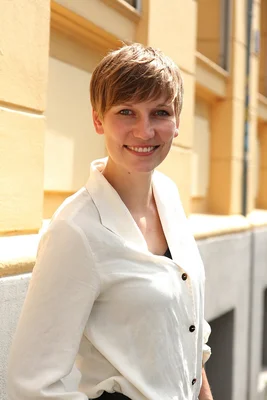
Jasmin Junghans
Student, Education - Sustainability - Transformation
